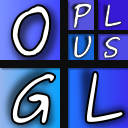This tutorial explains how to improve build times of large applications consisting of multiple translation units or large sets of individual applications using OGLplus. The rules described here also apply to using the OALplus and EGLplus libraries.
Generally OGLplus, OALplus and EGLplus are header-only libraries. Most functions just wrap the GL, AL and EGL calls, add some error checking enforce type safety, etc. Letting the compiler see the bodies of the functions allows it to perform certain optimizations and in case of smaller functions their bodies can be inlined if the compiler determines that it can improve the final binaries using the libraries.
Applications using them do not need to link to any binary library if their developers do not want it. Several parts of OGLplus, like the mesh/shape generators and loaders, image loaders, text rendering utilities, etc. however do include larger functions parsing and compiling of which can take some time, especially if all those functions are compiled again and again for every translation unit (.cpp file) that is part of a larger application. Similarly if there is a larger set of applications all using OGLplus then all the functions are compiled all over for every one of them. In both cases it would be advantageous to have the larger functions compiled only once and link their code to the final binary or binaries to improve build times.
Even more advantageous would be to have the ability to simply enable/disable the inlining. Disable it during the development to improve (re-)build times and enable it to let the compiler do optimizations in release builds. Fortunatelly OGLplus allows to do this by setting the value of the OGLPLUS_LINK_LIBRARY, OALPLUS_LINK_LIBRARY and EALPLUS_LINK_LIBRARY preprocessor symbols and following several simple rules:
In case of a large application consisting of many translation units using OGLplus one of the translation unit (preferrably the one that gets changed the least or even a dedicated one) needs to include the lib.hpp header:
To disable the inlining for a particular build ensure that for all translation units the OGLPLUS_LINK_LIBRARY, OALPLUS_LINK_LIBRARY and EGLPLUS_LINK_LIBRARY symbols are defined and set to 1. To build the library in header-only mode and to enable the inlining set then all to 0 or just don't define them at all and they will default to zero. Actually if only OGLPLUS_LINK_LIBRARY is defined and has some value set, then the other preprocessor symbols default to the same value.
In case there are several standalone executable just create a dedicated cpp file including the lib.hpp header(s), build it and all the other cpp files with OGLPLUS_LINK_LIBRARY defined and link the compiled object file that included lib.hpp to all the executables. To switch the inlining on/off use the same method as described above.
<matus.chochlik -at- fri.uniza.sk>
<chochlik -at -gmail.com>
Documentation generated on Mon Sep 22 2014 by Doxygen (version 1.8.6).
